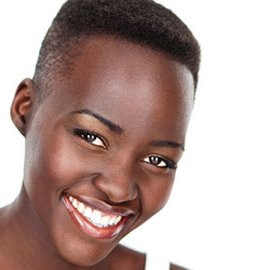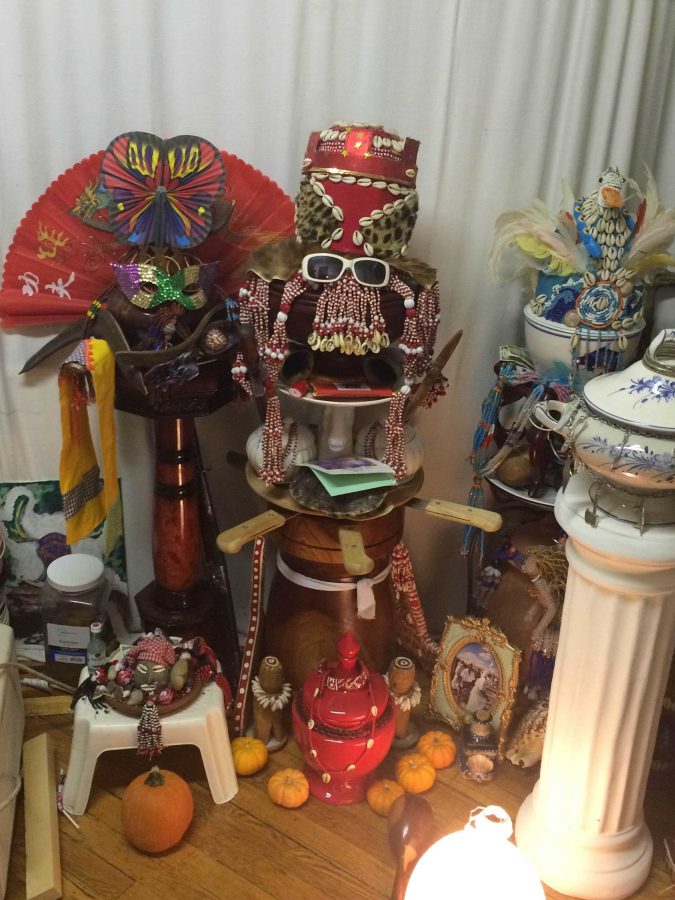
By Nahdya Ayele Kouevidjin
“Even the white man held the house nigga at a higher standard, this idea of the black girl wanting to be white was here way before you and I, before all of us and no one can tell me otherwise” (Baker)
As a part of a biracial family, Marie Baker has always been self-conscious about herself. Unlike her green eyes Italian/ African American siblings, her skin has always been dark and her hair very coarse.
“I’ve always felt different, even my mother treated me differently, almost like I wasn’t hers, but she couldn’t force herself to say it out loud” she chuckles as she stares down at an old Christmas family portrait with a younger and darker complexion Marie, one unrecognizable from the one sitting in front of me.
“Doesn’t look like me, does it” she sighs “Do you see anything wrong with this picture? This here was a lonely child,” she murmurs as she points to herself in the photograph on her lap.
To the observing eye, Marie was a beautiful, young girl with a milky smooth brown skin in a family of fair skin individuals, but to Marie, the picture brings about painful and unbearable memories.
Originating from Togo, a small state in Western Africa colonized by the French, Marie’s father John migrated to the United States at the age of 12, where he settled in with his uncle in New York. A beautiful, vivacious, petite blonde, green eyed Italian, Marie’s mother was born in Greene County, New York where she later met and befriended John at a local charter high school. The two soon became high school sweethearts and later got married.
As the fourth child of six siblings, Marie suffered from the middle child syndrome. “I always felt invisible and nothing I seem to do was ever good enough for my parents, mainly my mother. She did not like me. I was literally the black kid amongst my brothers and sisters,” she softly laughs to herself while she gloomily shakes her head and repulsively gazes with a deep look down at her skin.
The pain in her eyes screams louder than the tacit words from her mouth. “I came across a bleaching cream in high school, I must’ve been 13 or 14, a friend of mine introduced me to a bleaching cream called 55H+”
55H+ is a strong bleaching treatment used to treat scars, sun blemishes, aging spots and pregnancy blemishes, but significantly very effective in skin whitening. Its ingredients include harmful chemicals like hydroquinone, which helps to lighten the skin and disrupts the synthesis and production of hyper pigmentation, but because of its questionable health threats like fear of cancer risks, adrenal gland problems, conditions associated with mercury poisoning and physical changes to the skin and tissues around the eyes, ears and joints, hydroquinone has been banned from certain countries like France.
According to the online healthcare media publishing company Medicine Net, “some concerns about hydroquinone are that it causes leukemia in animals and research have proven that any perceived risks to humans are most likely applicable to African or black women.” Yet, well aware of the risks, one would think that more women would deter away from the use of such harsh chemicals but on the contrary.
Sidebar: Delusional Beauty: The Psychological Effects of Skin Bleaching
Aesha Kamar, a mother of three beautiful children, started her bleaching journey at a very young age, particularly for cultural reasons. As a Nigerian Muslim woman, Aesha explains that it is essential for her to present a certain visage to her community. She says “when I look and feel good, then it compliments my husband and my kids. It’s not a façade, it’s a customary thing.”
However, her husband Amir disagrees. He says, “For her to think I want this is far from ludicrous. I’ve asked her numerous times to stop and she just laughs it off like a joke and I feel like I’ve failed her because when I married her, I promised to keep her feeling secure and she doesn’t feel secure enough to be herself, so she does what she does?
But perhaps, it is the undying determination and desire to obtain a paler skin tone that seems to create a blinding effect on women like Aesha and Marie. To the oblivious eye however, it seems as though these women lack the proper education and are somewhat uninformed about the hazardous consequences of skin bleaching, however, that is not the case.
Based on recent studies conducted by the World Health Organization (WHO), one of the associations known for leading and organizing authority for health within the United Nations system, “more than 70 percent of Nigerian women admit they use such products despite their acknowledgment of the health hazards, which compares to 59 percent in Togo and 27 in Senegal.” It is beyond comprehension for anyone to willingly welcome and embrace diseases like cancer, just for a lighter skin complexion.
More alarmingly, these women’s despair cannot be measured. Some even use bleaching detergent as a gateway to a quicker bleaching result. As one of those women, Marie admits “I’ve tried using bleach a few times in the past but I didn’t get the results that I anticipated. With the bleaching cream, it helps lighten my skin but it is a process, but with the bleach, it did not speed up the process, it only made my skin blotchy and flaky.”
Startling, considering that bleach contains chorine which is acidic and can cause skin burns, irritations and irreversible damages to the skin, even when diluted. Recently, the Institute for Vibrant Living (IVL), one of the leading outlets for breakthrough health solutions, has reported that, chlorine bleach is an exceptionally corrosive chemical “enough to kill even the worst bacteria, it makes sense that it poses a danger to those who use it, and anyone exposed to it.” More so, chlorine is also reported to be one of the most hazardous substances among “the ten highest volume chemicals manufactured in the United States, and it was the first poisonous gas to be used as a weapon during World War I” (Institute for Vibrant Living).
However, the majority of black women still find the habit of skin bleaching luxurious, primarily because they firmly believe that a light skinned woman is most likely to succeed as opposed to a dark sinned woman. But could this be true? Are light skinned women given a freeway access to the ladder of success? Perhaps, when we look at the media, it may be the central representation of success, however, is this always the case? Take this old children rhyme for instance.
“If you’re black, stay back;
If you’re brown, stick around;
If you’re yellow, you’re mellow;
If you’re white, you’re all right.”
It pretty much explains it all. To be white or closer to white gives an individual acceptance into our society’s aristocracy, and despite the fact that many dark skinned women have made it into the upper classes, they are rarely praised and recognized.
Sidebar: The Redbone Media: Society’s Infatuation with the Light Skinned Beauty
So how do we justify the bias towards dark skinned people with women like Aesha and Marie? How hypocritical of us to judge and look down on women like Aesha and Marie for what they are doing when our concept of beauty and success centralizes around the images they are clearly trying to achieve? Who are we to condemn and attack them about their choices when every time they turns on the television screen, all the media advertises and presents to them as “beautiful” women are faces that look nothing like them?
As much as we as a society would like to wipe our hands clean of the issue, the fact remains that we too have been preyed upon by the media and our ideals no longer belong to us. For instance, we have somewhat become infatuated with the flamboyant lifestyle of celebrities, where rather than take care of our responsibilities, we would spend our time trying to maintain our looks, whether it be getting a new hair style, shopping for new clothes and at times, even attending the gym just to obtain the cookie cutter “figure” often illustrated in the media as “sexy” just to get attention.
So how different are we from Aesha and Marie? Do their bleaching activities make us any better than they are?
Undoubtedly, we are all entitled to our opinion, however, one thing we have failed to realize is that Aesha and Marie can be our sisters, our mothers, our daughters, our best friends, our coworkers, or even our neighbors. Yes indeed and more so, there is a “Marie” on almost every street in our society and it’s sad to see young women selling away their health and dignity in the name of beauty.
Maybe if we invest more time in reshaping our standards, and offer our mentorship to some of these young women, then we can help restore their confidence and help fill whatever void they may be trying to rebuild. After all, we are a nation, and as women we should help each other stand , we shouldn’t be too quick to knock each other down and neither should we criticize, for we hold the power to assist, inspire and make a difference.




